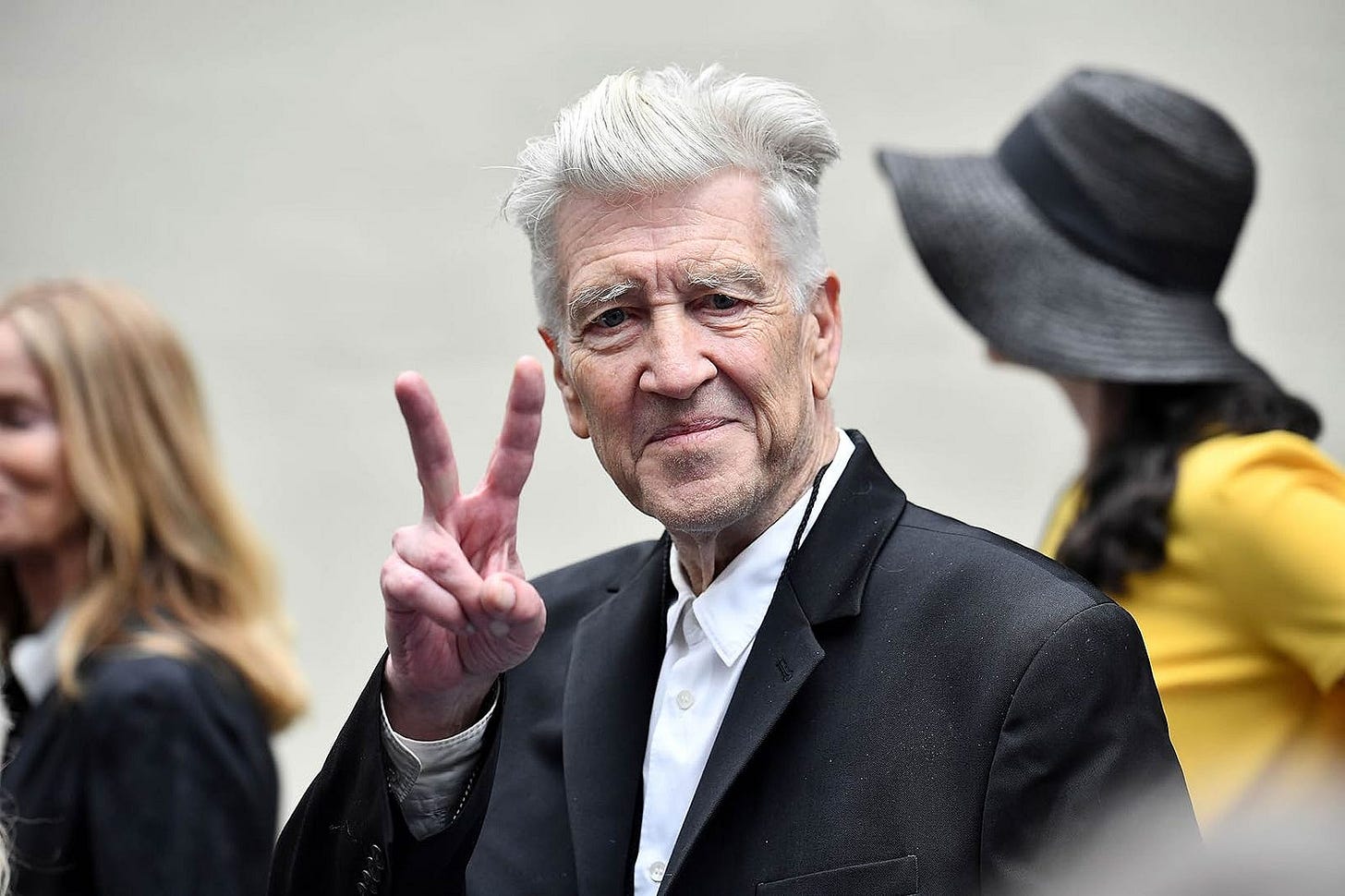An Open Letter To and In Honor of David Lynch
The man who redeemed the craft of film for me
The following is from the introductory section of my 2021 film review of Twin Peaks: Fire Walk with Me, directed and co-written by David Lynch, who passed away January 16, 2025. The passage has been slightly edited to speak completely to this occasion, serving as a message of remembrance to one of the greatest and most influential filmmakers and artists.

Among many other achievements, David Lynch helped stop my complete damnation of the film medium.
Once, I was only vaguely familiar with this filmmaker, painter, and musician. My primary experience of his work was seeing the opening of his film, Blue Velvet, in a college cinema class; a sequence that genuinely unnerved me. In early 2020, I came across one of Lynch’s YouTube weather reports, in which perhaps the most popular surrealist of this age gave straight-forward, daily weather reports from Los Angeles, famous for weather which hardly changes, just by looking outside his window. I laughed at the oddness of these videos for a week and moved on.
The videos must have stuck with me because, as 2020 became a gauntlet of woes, I became a constant watcher of Lynch’s reports. They were a meditative way to start my day, a fascinating exercise in observing one’s natural surroundings. He began giving pieces of advice and encouragement that would be conniving lies out of anyone’s lips but, from his, were unfiltered inspiration. He always closed his analyses with, “Everyone: have a great day!”. These reports, along with his later “Number of the Day” lottery videos, were one way I kept my sanity during 2020’s lockdowns and continual disasters.
I grew to admire the man and decided I should give his work a try, though I believed I would not like the surrealist’s art. To me, the style of surrealism meant art that was weird for the sake of being weird yet had to be taken seriously; nonsense demanding to be treated introspectively by virtue of elitist phrasing. The only surrealist film I had some affection for was the pieces I remember from the 1928 French flick, The Seashell and the Clergyman, which I saw in a college film course. The film samples’ discomfort and indescribable tones clicked with me, if only briefly. Still, I was unconvinced I would ever like a surrealist film.
But seeing Lynch’s first picture, Eraserhead, blew me away. I had no idea surrealism could be so enchanting, or what the style really meant. Much like my first attempt to finish the anime series FLCL, I was a fool for enforcing traditional narrative rules on pieces that operate primarily through emotions, ideas, and abstractions to express wordless feelings. “Plot” does not much matter to Eraserhead. Transportation to another realm does. The film is less about unplanned parenthood and more about being in a nightmare. The film both scared and captivated me, my mind racing with thoughts and gut-reactions through each strange image, event, set design, or sound. Lynch and company perfectly recreated the dream experience, which, for me, no film had done before. I felt like I had fallen into a bad dream so much that, during the film’s tense climax, my brother unexpectedly disturbed my solitary viewing and I jumped in shock.
Yet I did not want the nightmare to end; it was just too fascinating.
Eraserhead taught me that film can be more than drama and relay feelings solely through filmmaking elements. Since watching the film, I have been an unabashed fan of David Lynch. I speedily watched many of his interviews (my thanks to the Linda Faludi YouTube channel for archiving such material) and garnered books on his life, art, and transcendental meditation. This research eventually led me to his most beloved co-creation, a true work of everlasting art which I have gargantuan love for: the mystery saga Twin Peaks. Heck, my innocent enthusiasm for the man led me to lovingly parody this video with one of my own, starring me, and I almost never get in front of a camera. I could go on and on about my admiration for Lynch and his craft.
However, I now bring attention to how, from 2020–2021, a time when I was so disillusioned and heartbroken with film — the art form I once loved above all others and desired so much to be a part of — when I was about to give up on the medium entirely, Lynch saved the craft for me. In part, I would not be still writing and pursuing my artistic dreams without his influence.
Particularly as a former filmmaking student, I have long resented the following, subtle judgement of the populace: that becoming a respectable filmmaker means being exactly like one of the mainstream “greats” of cinema, such as Steven Spielberg, Quentin Tarantino, Stanley Kubrick, Sam Raimi, Edgar Wright, or Peter Jackson. In other words, a pre-packaged “cinephile.”
(To clarify, by the way: Spielberg, Wright, and Jackson are actually three of my all-time favorite directors, and I could sing praises to Raimi’s Spider-Man trilogy from sunup to sundown).
Such an individual is defined by countless sycophant video essayists like so: They are intellectually hip to new trends and endlessly knowledgeable of old cinema from across the decades. Raised on classic film and television as if they have no social life yet are ever socially busy. Amongst their obsessive, time-dissolving study of cinema, they are supremely intimate with the intricacies of film technology. Cultured experts of their craft and history, music, art, and science. To be one of the greats, if they wish to become a “real” filmmaker, one is forcefully expected to boldly laugh at fate and complete their first real feature film before their thirties.
I hate this image and the expectation in cinema discourse that all aspiring filmmakers must become this singular identity or else they are nothing. Especially as a young adult, I heard this rhetoric persistently and quietly judged myself poorly because of this ideology. Over the years, after several personal film project failures and painfully trying to be just like these great directors, I realized with defeat that I just was not like them for one-hundred-and-one-reasons, and never will be. I am only myself, and film culture beyond educational spheres kept showing me that being so was precisely what was wrong for my creativity and success.
However, discovering David Lynch, alongside watching old interviews from the classical directors Akira Kurosawa and Hayao Miyazaki, helped me see that this artist image was false.
While my disenchantment with film was about to end in grievous hatred in 2020, I found a documentary where Kurosawa powerfully said: “I don’t think I’ve yet fully grasped what a movie is.” He later explains the one constant he believed in was that film’s power lay not in a theme, but in its telling. I was floored. One of the greatest filmmakers of all time frankly said film could be anything.
Around the time I saw Eraserhead, during the pandemic lockdowns, I was re-watching every Studio Ghibli film and came across old interviews with Miyazaki, one of the studio’s co-founders. I realized he never worships old directors or talks about lenses, pacing, themes, or other auteur topics. Instead, he talks about politics. History. Culture. His life. Children. Nature. Cooking. Smoking. Clothes. Obscure parts of his complicated mind. Miyazaki talks about life, which makes film.
David Lynch completed this triumvirate of positive film philosophy, and on the most personal level. Rather than a traditional cinephile, he never wanted to be a filmmaker, but a painter, and did not grow up with all the expected, “mandatory” media or experience the “necessary” trials to make film. He did not grow up mostly in the movie theater or dream of Los Angeles. He sees film as awesome art, not the pinnacle of existence. Lynch talks about ideas being so important to art, always speaking humbly and directly. He emphasizes feelings and the hypnotism of film for the audience’s sake, experimenting to, as he always says, “stay true to the idea” of a project. He is a surrealist by his forte, and is rather funny, not overly serious about himself. Lynch promotes the idea that one need not be a depressed artist to make great art, and refuses to explain the meaning behind his films because, well, knowing is not really the point, silly.
He predominantly discusses paintings, music, history, smoking, coffee, pie, hamburgers, his memories, the weather, meditation, and the Dalia Lama, making his work unique. Lynch is wholly himself, and no one else. Someone who does not worship film but loves it all the same. A filmmaker who does not know the ins and outs of every part of film history yet has become influential to creative types and general audiences by making his own work and without, as far as I have seen and heard, being an absolute jerk. Indeed, he has many continuous collaborators, like Kyle MacLachlan and Angelo Badalamenti, because they dearly care for the man who does not believe in being a tyrant to make great work.
Above all, Lynch proved to me that what made a great filmmaker was their soul, not their life story, and that made all the difference for a troubled man like me.
Suddenly, film did not seem trapped in a pseudo-intellectual cage but full of possibilities again, where all I needed to do, like the mighty filmmaker suggested, was fish for ideas in the infinite sea of the imaginative subconscious. Eventually, I made my peace with the medium and have been looking forward to what I am and can do, not what I was and never can be.
I hardly hear film students and discourses discussing his craft, which is a shame. I so sorely regret not having discovered Lynch sooner in my life, though I would not exchange the day when, in February 2021, I first watched the Twin Peaks pilot for anything. At a crucial time in my life, he helped teach me that being myself is enough to make art of any kind, and I need not be true to anyone or anything but myself and “the idea” of my projects.
So, though I said these words when we inhabited this same Earth, in light of his passing from this world into a place both wonderful and strange, I repeat my open words to Mr. David Lynch. Thank you forever for showing me a truth I will never forget or forsake: that being myself is enough to be both a creative person and beautiful, even if I never make a cent doing so and my form never changes. Have a cup of coffee on me.
~Charles X. Rodriguez





